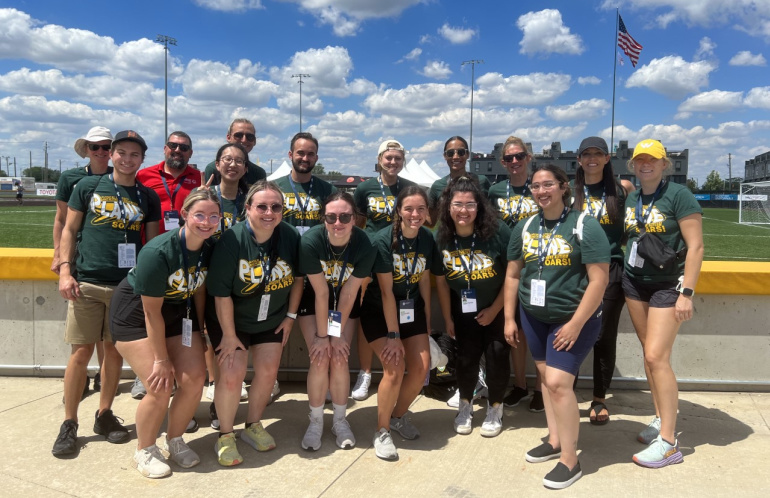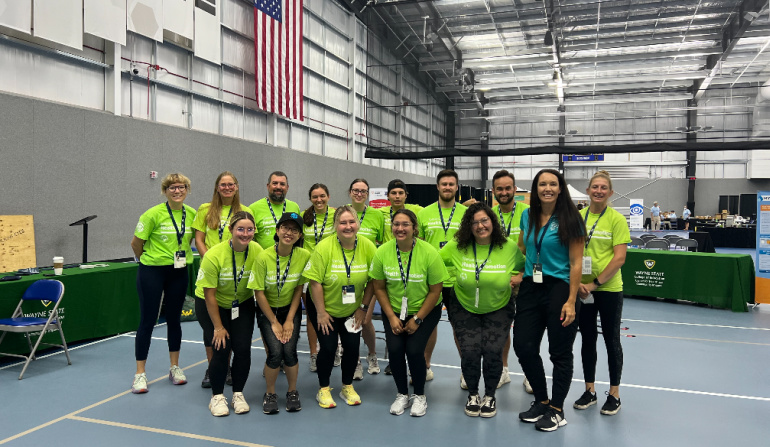
What goal do the Wayne State University College of Education’s Center for Health and Community Impact and the Special Olympics Unified Cup have in common? Both want to ensure that individuals of all ability levels have opportunities to learn, flourish and inspire through involvement in sports and other physical activities.
Leah Ketcheson, Ph.D., assistant professor and program coordinator for health and physical education teaching, and 22 students from the Division of Kinesiology, Health and Sport Studies volunteered during the Special Olympics Unified Cup, which took place in Detroit last week. An international soccer tournament, the event included more than 300 athletes from 22 countries.
The competition seeks to challenge and eliminate stereotypes about athletes with intellectual disabilities. By having athletes with and without disabilities compete together as teammates, the tournament highlights how sports can empower individuals and promote unity, acceptance and inclusion.
The college’s Center for Health and Community Impact and Division of Kinesiology, Health and Sport Studies co-sponsored the event, which was held at locations throughout metro Detroit, including the Corner Ballpark, site of the former Tiger Stadium. The center’s mission is to improve community health and vitality through diverse and inclusive programs, advocacy and research.
“We are proud to support the Special Olympics Unified Cup,” said Nate McCaughtry, Ph.D., center director and assistant dean of the division. “Like the Special Olympics, we strive to advance health, well-being, equity and success and to improve physical, mental, and emotional health and performance in communities throughout the world. We look forward to continuing to collaborate with the organization to educate, engage and empower individuals through sports.”
Ketcheson was appointed Special Olympics clinical director for health promotion in June. In this role, she administers health screenings at all major Michigan Special Olympics events and consults about health promotion programming across the state. In addition to providing health screenings at the Special Olympics Unified Cup, Ketcheson — whose teaching and research centers on implementing and studying the impact of healthy living programs for individuals with physical, learning and other developmental disabilities — was principal investigator of a physical activity study that was conducted throughout the tournament. This large-scale research project objectively measured physical activity during the elite level play to understand the kinds of exercise benefits that participants receive and to correlate physical activity with a range of other health, social and developmental variables.
“We hope this research offers new knowledge on the patterns of physical activity between athletes with and without disabilities,” she said. “We believe the dissemination of these findings will help improve health programming for countries around the world.”
Ketcheson said it was vitally important to also provide students with opportunities to interact with athletes of all abilities from around the world and to hone their research skills.
“Assisting with the Unified Cup not only helped students see firsthand how sporting events are produced on a global scale, but it also underscored the importance of issues related to diversity, equity and inclusion,” she said. “Whatever career they pursue, they will work with people from diverse backgrounds who have different skills, abilities and life experiences. The opportunity to practice connecting, communicating and collaborating with individuals on an international level as well as to obtain real world experience was invaluable.”

Ketcheson and her team of undergraduate and graduate research assistants provided health services and conducted multi-dimensional wellness assessments with athletes. Screenings provided competing athletes with an opportunity to learn critical information about their current health status. Findings will also provide useful information to Special Olympics about the health status and needs of their athletes that can be used to further promote health and inform future competitions.
“Individuals with developmental disabilities experience significant health disparities when compared to the general public,” said Ketcheson. “The opportunity to receive health screenings — including bone density, blood pressure and body mass index — provided athletes with information they can share with their coaches and use to advocate for themselves.”
While Ketcheson and her team volunteered to support the Special Olympics athletes and organization, she believes their involvement also provided her students with valuable insights about a range of potential career options.
“This hands-on experience bolsters our students’ confidence in their ability to serve those with diverse abilities,” she said. “This opportunity included ample training on various health measures and administering assessments with individuals with disabilities, which will help ensure that Wayne State students — regardless of their career path — will be prepared to meet the diverse needs of individuals they serve in the future.”
The Wayne State student volunteers indicated that volunteering was a rewarding learning experience.
Brendan Zyrek, a senior majoring in exercise and sport science, said he has a deeper appreciation for collaboration and the way sports can bring people together.
"I was able to develop a more profound understanding of the word ‘unity’ from volunteering and observing the Unified Cup in Detroit,” said Zyrek, who wants to be an occupational therapist. “I learned that those with intellectual disabilities and those without can come together and work effectively as a team for a common goal — to have fun and, of course, win. This event opens the door to unifying everyone — in sports and in our everyday lives."
Brooke Hanson, who also studied exercise and sport science, earned her bachelor’s in May. An aspiring physical therapist, she said the perspective she obtained by supporting the event will prove useful whenever she begins a Doctor of Physical Therapy program and throughout her career.
“My experience conducting research at the Special Olympics Unified Cup will help me in the classroom by giving me the ability to relate what I'm learning to the real world,” she said. “As an exercise and sport science major, I learned about similarities and differences across various populations. Participating in this event gave me even more insight into understanding that differently abled athletes are just as capable as able-bodied players at playing a high-level sport. Just because someone has an intellectual disability doesn’t mean they cannot do what a neurotypical person can. This is helpful knowledge to apply in the classroom and in the real world.”
Samantha Miller will be a doctoral student in kinesiology with a focus in Adapted Physical Activity and Physical Education at Wayne State this fall. She said her involvement made her interested in pursuing a career in academia.
“Being a part of the physical activity research and athletes’ health screenings sparked a passion and excitement for research that I never realized I had,” she said. “Athletes from all over the world expressed interest in what we were doing, which only validated how important and groundbreaking this work is. This experience confirmed my decision to pursue my doctorate in kinesiology and inspired countless ideas for future research.”
McCaughtry mentioned that providing students with opportunities to participate in experiential learning activities is an integral part of all the division’s programs.
“When students participate in these types of activities, they enhance their understanding of course material and get opportunities to practice applying it,” he said. “Volunteering for the Special Olympics Unified Cup allowed our students to address real community health needs, develop professional skills and competencies, broaden their view of the world, and begin envisioning the role they can play in our larger society. Exposing students to these types of events and experiences is essential to their academic and career success.”
